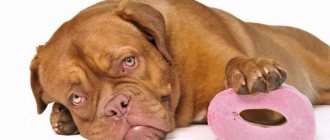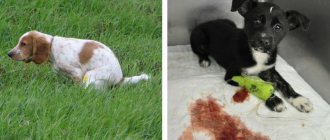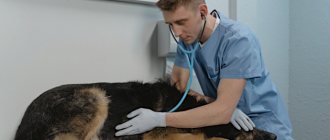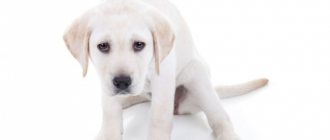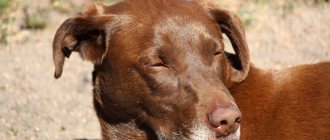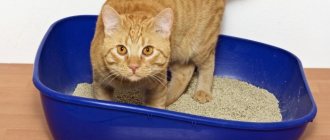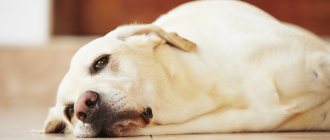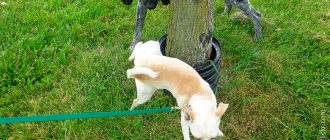The appearance of diarrhea in pets is an unpleasant event, but people often neglect it. Diarrhea in dogs does not always require treatment. It goes away easily from overfeeding, but often this disorder develops into a serious problem. Studying the causes, varieties and symptoms of this disease is an important task for a responsible dog breeder.
Diarrhea and its main symptoms
Dog diarrhea, or diarrhea, is the repeated emptying of liquid feces due to problems with the digestive system.
Every owner faces this problem at least once. Sometimes a dog’s diarrhea ends quickly, and sometimes it lasts for several days or even weeks, causing a lot of inconvenience to the pet and its owner.
If the attack of diarrhea was a one-time occurrence, there is no particular cause for concern, but prolonged loose stools are considered a reason to consult a veterinarian. The level of danger increases the appearance of blood, mucous masses in the stool, as well as the lethargy of the pet. Diarrhea is often accompanied by vomiting and fever.
The causes of diarrhea in dogs can often be determined by the color of the stool. Treatment is symptomatic and takes place mainly at home. To prevent dehydration of the body, plenty of fluids and adsorbent drugs are prescribed. In serious cases, antibiotics are used - they are prescribed by a veterinarian.
Prevention of the disease
Diarrhea and vomiting in dogs occur due to owner violations of feeding and animal care rules.
Prevention of diarrhea and vomiting consists of fulfilling the following conditions:
- Bring the conditions of keeping animals in accordance with zoohygienic parameters.
- Pets are vaccinated against particularly dangerous diseases.
- Dogs are regularly dewormed and treated against fleas and other ectoparasites that carry worm larvae. It is convenient to use double-action drops, which are applied to the withers.
- Use complete feeding, preferably factory-made dehydrated pellets. If you use natural products, balance the diet with all nutrients. When growing puppies lack minerals and vitamins, they chew on balconies, lick whitewashed walls, and pick up poisoned baits and inedible objects from the ground.
- When feeding naturally, avoid giving raw meat. Its surface is infested with helminth larvae or pathogenic microorganisms.
- Do not treat the dog with human food.
- Pets are trained: they are taught not to take food from the floor or ground.
- Do not use vitamin and mineral supplements without consulting a veterinarian.
- Do not feed ready-made food and natural products at the same time. They require different enzymes to digest them. A malfunction occurs that causes indigestion.
- Blocking access to the trash can.
Frequent bowel movements without complications
Unpleasant consequences of poisoning, infections, and an unbalanced diet can be loose stools in a dog. It is often uncomplicated by other symptoms, but still causes anxiety for the pet.
Factors of occurrence
If your pet defecates more than four times a day with liquid feces, it is diagnosed with diarrhea. It can be caused by simple factors:
- spoiled food;
- changing the type of feeding;
- poor quality feed;
- food allergies;
- binge eating;
- infection with intestinal parasites.
In such a situation, it is important to find out the cause and quickly eliminate the source of the problem.
Treatment
First, it’s worth adjusting the diet: remove everything that is stale and switch the animal to natural food with fastening elements. This is a low-fat meat broth with rice. It is acceptable to eat turkey or beef with steamed vegetables.
If you are sure that the dog has not eaten stale or inappropriate food, has not been poisoned and has allergies, you need to start specific treatment.
First of all, you need to try not to feed the dog for a whole day. The amount of water you drink is significantly increased - this will prevent dangerous dehydration of the body.
Adsorbent drugs that remove toxins have proven themselves well. Prolonged diarrhea in a dog is treated with antibiotics, used strictly according to the instructions. If worms become a result of liquid feces, then anthelmintic drugs are prescribed.
Diarrhea accompanied by vomiting
It is more difficult to cope with the situation when the dog’s diarrhea is complicated by vomiting. There is no need to worry about a single cleansing of the stomach, but multiple vomiting, removing fluid and undigested food residues combined with gastric mucus, becomes a reason for an immediate visit to the doctor.
When appears
Diarrhea with vomiting in a dog can be due to:
- excessive food consumption;
- stale food;
- unbalanced diet;
- food or other poisoning;
- swallowing a foreign object;
- prolonged inhalation of unknown chemicals;
- bloating, accompanied by shortness of breath and excessive salivation;
- helminthiasis – infection with worms.
However, the most dangerous cases of repeated frequent bowel movements with vomiting can be infectious viral diseases. For example, distemper or parvovirus enteritis occurs in puppies from 2-6 months. Due to the formation of numerous erosions on the intestinal mucosa, the animal stops eating, drinking and quickly fades away. Against the background of the disease, a decrease in temperature occurs, as well as dangerous changes in the functioning of the heart. Without timely help, the death of a pet occurs.
Rotavirus and coronavirus occur in individuals of different ages, but symptoms in young animals are more severe. Dehydration as a result of loss of electrolytes is dangerous for the health of animals, but the use of special drugs can cope with the disease within seven days.
Also, vomiting with diarrhea in four-legged animals of any age is caused by an adenovirus. The known symptoms include increased temperature, inflammation of the mucous membrane of the four-legged friend’s eyes, and enlarged liver. With proper care and use of medications, the disease goes away within 14 days.
Treatment
For short attacks, the same measures are usually sufficient as in cases with uncomplicated diarrhea: dietary restriction, drinking plenty of fluids, and using adsorbents. To stop spasms, use no-shpa and papaverine as prescribed by a doctor. A strengthening diet maintained for several days helps a lot.
Vomiting in combination with liquid feces washes out necessary substances from the body, so it is recommended to administer solutions that replenish the animal’s water-salt balance. The damaged microflora is restored by introducing fermented milk products and special probiotics for animals into the diet.
Repeated cases of bowel movements and vomiting are signs of a serious illness or serious poisoning, which tests will help identify. Your veterinarian can prescribe medications for infections, viruses and parasites in the intestines. In case of poisoning, gastric lavage will be effective.
Intensive therapy
Vomiting and diarrhea are especially dangerous for puppies. With large losses of fluid, they die very quickly.
The main reason for the appearance of the described pathological conditions in them is viral infections. Timely assistance is the key to successful recovery.
What will the doctors treat?
- The introduction of solutions, only often not subcutaneously, but more effectively intravenously.
- Antiemetic drug Sereniya .
- Antibiotic therapy if indicated.
- Diet depending on the cause of vomiting and diarrhea.
- Antihelmintics and antiprotozoal drugs if indicated.
- Surgery or chemotherapy for neoplasia.
- Immunosuppressive therapy for certain conditions, such as enteropathy.
- Administration of detoxification drugs orally, for example Enterozoo.
We do not recommend using the above treatment methods on your own. In each individual case, consultation with a veterinarian is necessary.
Loose stools with blood or mucus
If there is blood and mucus in the dog's excrement, then immediate consultation with a specialist is required. Only a veterinarian can prescribe the necessary medications and treat diarrhea in dogs in such cases.
Possible reasons
As a rule, a blood test and examination of the pet help to accurately determine what caused the disease. In difficult situations, feces are taken for examination, and x-rays of internal organs are also taken.
Possible causes include:
- mechanical damage to the intestinal walls from a swallowed foreign object;
- pancreatitis;
- open stomach ulcer;
- dysbacteriosis;
- intestinal parasites;
- infection;
- tumors in the rectum;
- enteritis;
- hemorrhagic leptospirosis.
Any of these factors can only be identified by an experienced specialist, who needs to be contacted in case of repeated cases of diarrhea accompanied by bleeding.
Treatment
Complicated diarrhea cannot be ignored because it can cause serious harm to the health of your pet. If frequent bowel movements have stopped on their own, a visit to the clinic will still not be superfluous. The examination will help confirm the diagnosis and suggest how to treat diarrhea in a dog at home.
When poisoning caused by various reasons is detected, the stomach is washed in the hospital, adsorbents are given, and in difficult situations, antibiotics are prescribed in the form of injections, tablets or droppers. When diagnosing tumors, surgery is performed.
In a dog, bloody diarrhea due to dysbacteriosis is usually a consequence of poor nutrition. In addition to prescribed treatment recommendations, the veterinarian will help you adjust your diet to avoid recurrence of the disease. Among the drugs used are probiotics, antiseptics and immunomodulators.
The removal of intestinal worms is facilitated by antiparasitic drugs that suppress their development and relieve symptoms. Such medications are given based on the weight of the pet.
Infections of the gastrointestinal tract, bacterial and viral diseases require long-term treatment with antiviral drugs and antibiotics strictly as prescribed by the doctor.
Unusually colored excrement
The color of a quadruped's stool depends on the food it eats. In another situation, it is worth finding out why the changes in the color of the feces occurred.
Possible factors
So, a black color can indicate dangerous bleeding from the duodenum or stomach - or be a common consequence of using activated charcoal or iron-containing drugs.
Yellow feces are a consequence of liver dysfunction, indigestion, or the presence of worms. If yellow stool causes a drop in temperature and a strong unpleasant odor, then most likely it is parvovirus enteritis.
Rarely does stool appear white. This color indicates the absence of bile in them due to blockage of the bile ducts. Blood impurities indicate the presence of intestinal injuries, severe inflammation or viral infections in the animal.
The green color of feces is associated with the process of fermentation or rotting in the dog’s intestines due to spoiled food. It also becomes a symptom of dysbiosis, gastrointestinal diseases, and the development of infections.
Treatment
What to give a dog for diarrhea of an unusual color is decided by a specialist after conducting an examination and studying the test results of the sick animal. The most commonly prescribed medications are conventional medications that are suitable for all types of intestinal disorders.
Having established the reason for the coloring of excrement in an uncharacteristic color, the veterinarian gives certain recommendations. There are a number of common uses:
- food restriction for at least a couple of hours, and preferably for a day;
- menu adjustments;
- drinking small portions;
- use of adsorbents.
Following the recommendations of a veterinarian is important not only for curing a four-legged animal. Independent selection of medications and the use of traditional methods can harm your pet. And untimely access to the clinic leads to late diagnosis of serious diseases.
How does diarrhea develop in a dog?
The dog's intestine consists of 2 sections: thin and thick. In the first, food coming from the stomach is broken down, useful components and water are absorbed. Unnecessary residues move into the large intestine to be passed out as feces.
Inflammation of any origin disrupts this well-functioning process:
- the absorption of mineral compounds is disrupted, they attract water, which immediately comes out;
- the mucous membrane is damaged, blood and pus seep into the lumen;
- the secretion of intestinal juice and mucus increases, which increase the volume of feces;
- peristalsis accelerates.
One or a combination of the listed disorders becomes precursors to diarrhea, scientifically called diarrhea. Inflammation of the small intestine is called enteritis, and inflammation of the large intestine is called colitis.
By the nature of the stool, you can determine in which department the inflammatory focus has formed:
- A lot of fluid enters the small intestine, food is broken down, so the stool is copious, watery, sometimes with pieces of undigested food.
- There is little fluid in the large intestine, the inflammatory focus is closer to the anus, and feces are more difficult to retain. The stool is frequent, small in volume, and often contains blood and mucus.
Acute diarrhea occurs suddenly and lasts from 1 day to 2 weeks. If the cause is not eliminated, it becomes chronic and does not stop for weeks.
The main danger of diarrhea is dehydration. Water maintains normal blood pressure and participates in metabolic processes. With a lack of fluid, the functions of the kidneys, liver, and heart are impaired. Puppies and older animals react more severely to lack of moisture.
Caring for a sick dog
Unfortunately, the owner of an animal is not always able to quickly respond to a problem and consult a veterinarian. Therefore, there is a need to use medications intended for humans. What medicine should I give my dog for diarrhea at home so as not to harm it?
Medicines and folk remedies
The owner chooses how to treat the pet himself, but each individual case requires consultation with a specialist.
The most popular medications for diarrhea in dogs are:
- Activated carbon;
- Enterosgel;
- Smecta;
- Enterofuril;
- Furazolidone;
- Loperamide;
- Levomycetin.
An extensive list does not mean that you can uncontrollably stuff your pet with these medications. Herbal preparations from St. John's wort, oak bark, and chamomile should also be used only after consultation with a specialist. The veterinarian will tell you how to calculate the dosage based on the weight, size, breed, age and condition of the dog. Some medications can cause serious allergies in four-legged animals, and in case of overdose, poisoning and convulsions. Therefore, independent treatment is contraindicated.
The only thing you can do at home when your dog has diarrhea is to adjust the diet and increase the amount of fluids.
Diet food
After diarrhea, the dog begins to feel hungry, but it is correct not to feed it for the whole day. The main thing at this time is to adhere to the drinking regime, giving the animal plenty of clean bottled water. After a day, it is recommended to keep the dog on a gentle diet for several days.
What to feed a dog with diarrhea? It is useful to give rice boiled in water or give the animal a thick rice broth. If diarrhea is over, then to maintain strength, give beef or chicken broth, low-fat fermented milk products, boiled chicken breast. Meals should be fractional and portions should be small.
Features of treatment at home
The choice of treatment method and therapy in each specific case is individual. It all depends on the symptoms and characteristics of the course of diarrhea, as well as the degree of neglect of the disease. In some cases, it is enough to normalize nutrition and complete restoration of stool will occur in 1-2 days, and sometimes long-term drug treatment, surgical intervention, etc. may be required.
If the diarrhea lasts no more than two days and is not complicated by side symptoms, first of all, it is necessary to reconsider the animal’s diet.
At the first stage, it is recommended to carry out daily therapeutic fasting. At the same time, drinking plenty of fluids is maintained, without restrictions. The next day after unloading, the pet must be offered easily digestible food, food that contains boiled poultry, boiled eggs and rice in meat broth.
It is also recommended to treat diarrhea at home using the following methods:
- Dosed intake of adsorbents. This can be enterosgel or standard activated carbon, sold in pharmacies without a prescription. These products are absolutely safe for the animal’s body; moreover, with their help it is possible to remove a significant amount of accumulated toxic substances. It is easy to calculate the dosage: 1 tablet for every 10 kg of dog’s body weight.
- We use decoctions of medicinal herbs, healing infusions containing astringents and tannins and microelements. Chamomile or oak bark are ideal.
- Smecta is able to cope with diarrhea and relieve signs of intoxication.
When to contact a veterinarian
In most cases, it is enough to consult a specialist over the phone - if the diarrhea is not complicated by anything, you can cope with it on your own. The doctor will tell you what to do at home for diarrhea in dogs. If he recognizes something threatening in the symptoms described, he will invite you and your pet for an examination.
If your dog's diarrhea has not stopped for 4-5 days, and you have already tried everything, you need to go to the clinic. The animal needs IV drips to prevent it from dying from dehydration. Veterinarians will also examine the four-legged patient and provide more serious care.
Diarrhea in a puppy should not be treated at home - especially if the baby is less than 6 months old. A young body is unable to resist even a mild illness, so seeking help is mandatory. Also, diarrhea in puppies often warns of serious viral diseases that need to be treated in the first few hours of manifestation.
You should drop everything and go to the doctor if your dog’s diarrhea is accompanied by repeated vomiting, lethargy and loss of appetite, convulsions and loss of consciousness, constant trembling, elevated temperature - everything can indicate serious illnesses. In such cases, treating diarrhea in a dog at home is unacceptable, since stool upset is only a secondary problem. But the primary care should be handled by a specialist, that is, a veterinarian.
